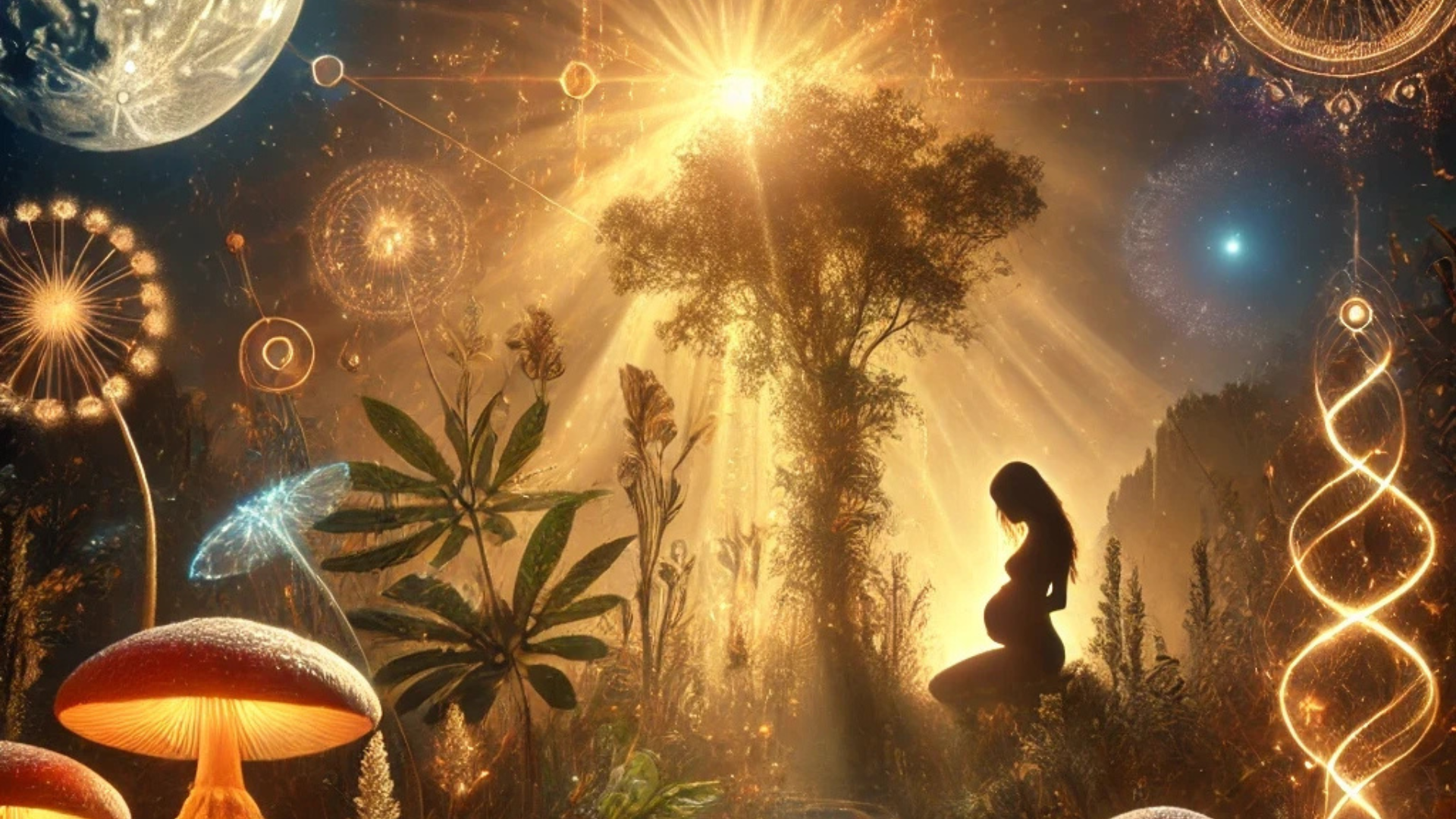Mikaela de la Myco is intimately aware of edges and comfortability as natural medicine conversations open new doors into feminine identity, expression, and dis-ease. She founded Mothers of the Mushroom, owns and operates MushWomb, and engages with psychedelic medicine in feminine-coded rites of passage: menses, fertility, pregnancy, birth, breastfeeding, perimenopause, and menopause.
Mikaela’s work serving citizen science is stepping center stage beyond the psychedelic revival. Mothers of the Mushroom’s psilocybin research study within the motherhood container is now noticed in mainstream press and allopathic medicine. Following a signal boost from the recently released Microdosing for Health, Healing, and Enhanced Performance, Mikaela shares her POV on the twin healing mysteries of natural medicine and inner wisdom with Reality Sandwich.
Summer Lopez: I’m excited to continue the conversation you began with Holly Crawford over on YouTube. So, everything about the natural medicine space feels like it has catapulted since 2025 arrived. Even Oprah’s dropping in.
Mikaela de la Myco: I’ve been in this space for over ten years. An increased awareness of what microdosing is, how it might be helpful for people, and an earnest desire to try it because of people like Michael Pollan and Oprah literally saturating the airwaves. As someone who’s seen the space transform a lot over time, I’m grateful and also want to continue stewarding a space of safety and education for newcomers.
SL: When we enter collective conversation about commercial psychedelics and legislative licensure, what are your thoughts about women who have facilitated healing underground using plant medicine literally for decades? Do they even want or need the permission of a license?
MM: No. I’ve been very outspoken about my critique of the legalization process and what it’s done. And how it’s treated alternative medicine modalities in the past, like midwifery. Who are we protecting in that legalization framework, and how are we protecting them? If legalization in any way is going to look meaningful, it will be protections for use and not stringent systems for how to capitalize, monopolize, or organize business around psychedelics.
SL: It also feels like the citizen science of Mothers of the Mushroom is expanding into what allopathic medicine considers highly-regulated OB/GYN territory. Can you tell us more?
MM: The care mothers are receiving from mushrooms can absolutely happen in collaboration with, in tandem with, and in shared care with primary care providers like OB/GNs, midwives, therapists and other doctors. In terms of consent and safety, in this country, we’re torn on who has a say in a woman’s right to choose.
I can certainly understand people might get triggered by moms ingesting mushrooms while pregnant. We are looking at mushroom use among mothers that had already made this choice in the past, and reporting outcomes for themselves and their children. Only 178 of the 411 ingested while pregnant and the majority ingested pre-pregnancy. Mothers eating while pregnant represent a population in the motherhood container. Whether or not the collective United States feels that’s a consent violation is very reflective of what we feel about mothers’ agency.
SL: Can you share insight into how psilocybin might support the healing of lunar-regulated, female bodies during menses, fertility, pregnancy, birth, breastfeeding, perimenopause, and menopause?
MM: The needs of the changing body vary dramatically. Psilocybin can be a helpful ally during transitional phases. It’s a rather safe substance to work with throughout life. Psilocybin presents in the body similar to serotonin, a neurotransmitter for sharing messages from many parts of the body. Only 10% of serotonin is in the brain, the rest is in the gut. Our relationship to serotonin, and other myriad constituents inside of psilocybin’s entourage effect, can be nutrition to bodies that change: hormone regulation and pacing, reduction of pain in the body, reduction of inflammation. Symptoms start to soften. We’ve seen support in things like pregnancy loss, abortion, stillbirth.
As we move into pregnancy, breastfeeding, postpartum—the pressure, the fervor, and the rite of passage of the motherhood archetype can be supported by mushrooms. We’re seeing with psilocybin a correlation between use and relationship to libido, desire, and comfort in the body. Women, transforming their sense of self, their attractiveness to themselves, their desire to want to connect with their partners, their relationship to their bodies being more positive.
SL: What’s your take on plant medicine supplement start-ups launching commercial products like Opal & Joy’s perimenopausal line?
MM: All hail companies that want to come in and solve a problem. I think supplements are great. What I do see is a removal of relationships. These plants are part of an ecosystem of the natural world. When people receive medicine from a capsule with little to no connection to where it comes from, the spirit, its source, its life, what it looks like, people really miss out on a depth of connection.
SL: If I’m setting a Google filter to watch this emerging space, which key topics, dates and participants do you recommend including or excluding?
MM: People are noticing similar problems in the larger world—like rape culture and violence against women and girls, ethics of extraction and treating the planet like a commodity that can just be taken from without consequence—showing up in our psychedelic community, in the wellness space. Definitely include: survivor advocacy, harm reduction, sexual assault, mothers, indigenous wisdom systems, and plants.
I would exclude any proscriptions around how to have a relationship with psychedelics. I think it’s important to take the Michael Pollans of the world and the Paul Stamets with a grain of salt because their perspective represents a small percentage of people that are journeying.
SL: Not to lean into future-tripping, but… Where do you see the collective timeline going from here, in terms of research and administration of psychedelic medicine for female bodies? Do you see a path to integrating the citizen science of Mothers of the Mushroom with allopathic medicine?
MM: The barrier for entry to bring data to the people is far too high for some of the topics we’re trying to tackle. So I hope to see, and will continue to bear witness to, more citizen science. There has been a very clear exclusion of women from research in all areas, but there’s more women leading in this space than ever. Our voices being at the center opens up what research is going to do, what policy reform is going to look like. Mechanisms for evolutionary and epigenetic change are in the hands of families and mothers and communities and people rearing up children. Rematriate medicine, period.
Catch Mikaela de ly Myco on Reality Sandwich’s Share Your Experience series below.















